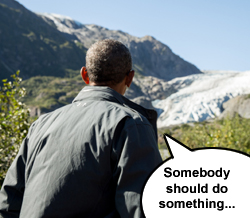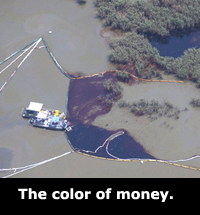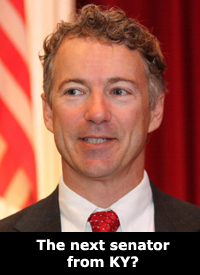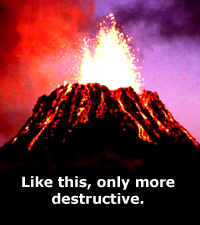Another one of those weeks. Seems like there have been a lot of them just lately. In any case, it was notable that the President spent part of the week up in northern Alaska, getting his picture taken in front of melting glaciers. This represents political jiu-jitsu of positively Clintonian proportions, as it was only last week that Obama’s administration gave the nod to Gulf Oil to start drilling in the arctic – a region so remote that even the inadequate remediation services available in places like the Gulf of Mexico are unavailable. Gulf’s business plan, I assume, relies on a lot of good luck (as well as a steadily warming climate). Their disaster response plan is probably the same boilerplate bogus document BP used.
 Right, so … Barry let Gulf oil start drilling in ocean recently freed up by the effects of burning hydrocarbons, but that’s okay, because he renamed Mount McKinley and talked about how we’re not moving fast enough on climate change. Yeah, no shit, Mr. President – there’s an obvious solution to that, of course. Stop dragging your own damn feet. Obama’s efforts to address the impending climate catastrophe are progressing so slowly that those glaciers he visited seem speedy in comparison. He should have named that mountain “Denial-ly”.
Right, so … Barry let Gulf oil start drilling in ocean recently freed up by the effects of burning hydrocarbons, but that’s okay, because he renamed Mount McKinley and talked about how we’re not moving fast enough on climate change. Yeah, no shit, Mr. President – there’s an obvious solution to that, of course. Stop dragging your own damn feet. Obama’s efforts to address the impending climate catastrophe are progressing so slowly that those glaciers he visited seem speedy in comparison. He should have named that mountain “Denial-ly”.
I’m not sure what’s more aggravating, a right-wing politician (name pretty much any one) who champions climate change skepticism or someone like the President, who obviously knows better but lacks the will (or perhaps the spine) to do what needs to be done – to propose solutions appropriate to the scale of the problem. This eight years may turn out to have been the last best hope for putting the worst effects of global climate change in check. My guess is that Obama knows this, but if so, how can he not at least try to take the necessary steps, not the usual scrum of half-measures?
Climate change will not be blown back by rhetoric. It doesn’t yield to compromise solutions. We have to stop thinking in terms of short-term political expediency and realize that when it comes to survival on this planet, half-measures won’t do.
luv u,
jp

 This is generally true of the extractive energy industries. Oil is being sought from ocean depths far more profound than either drilling or safety technologies can facilitate. It is being rendered from the tar sands of western Canada, where the very earth is being ground to squeeze every ounce of the precious fluid for export to the U.S., mainly. (As a result, Canada was recently our single largest source of oil.) The volume of global reserves is calculated based upon those deposits that are economically feasible to extract – as the price per barrel rises, more reserves enter the equation. The trouble is, the very act of extracting them from an exhausted mother earth causes as much environmental degradation as burning the oil in generators and vehicles.
This is generally true of the extractive energy industries. Oil is being sought from ocean depths far more profound than either drilling or safety technologies can facilitate. It is being rendered from the tar sands of western Canada, where the very earth is being ground to squeeze every ounce of the precious fluid for export to the U.S., mainly. (As a result, Canada was recently our single largest source of oil.) The volume of global reserves is calculated based upon those deposits that are economically feasible to extract – as the price per barrel rises, more reserves enter the equation. The trouble is, the very act of extracting them from an exhausted mother earth causes as much environmental degradation as burning the oil in generators and vehicles. Why the hell are we in Afghanistan? Our leaders say it’s to disrupt and destroy Al Qaeda so that they cannot plan new attacks on us. But to the extent that people like Osama Bin Laden are involved in operational planning for global terror attacks, all he and his pals need is a room (or a cave, but I suspect a room) big enough for a white board. Can anyone claim that we have denied him that in nearly nine years of war? Did our drones stop the Times Square bomber? (Fact is, they helped push him over the edge.) Where’s the story on that, kids?
Why the hell are we in Afghanistan? Our leaders say it’s to disrupt and destroy Al Qaeda so that they cannot plan new attacks on us. But to the extent that people like Osama Bin Laden are involved in operational planning for global terror attacks, all he and his pals need is a room (or a cave, but I suspect a room) big enough for a white board. Can anyone claim that we have denied him that in nearly nine years of war? Did our drones stop the Times Square bomber? (Fact is, they helped push him over the edge.) Where’s the story on that, kids? What, objectively, can our government do? Well, a lot more, it seems. Our regulatory mechanisms are mere appendages of the industries they are charged with overseeing. In many cases – such as with the Minerals Management Service- that was the intention. We’ve also just come off of a long period – eight years – of having former oil industry executives in charge of the government. That greatly enhanced the culture and practice of “hands off” regulation specific to that industry – an approach that was generalized to the rest of the economy. So the first thing that needs to be said about this crisis is that it is in large part another parting gift from George W. Bush and Dick Cheney. Just add that to the pile, right next to the financial crisis, the Citizen’s United Supreme Court decision, the continuing wars in Iraq and Afghanistan, and so on. What’s next?
What, objectively, can our government do? Well, a lot more, it seems. Our regulatory mechanisms are mere appendages of the industries they are charged with overseeing. In many cases – such as with the Minerals Management Service- that was the intention. We’ve also just come off of a long period – eight years – of having former oil industry executives in charge of the government. That greatly enhanced the culture and practice of “hands off” regulation specific to that industry – an approach that was generalized to the rest of the economy. So the first thing that needs to be said about this crisis is that it is in large part another parting gift from George W. Bush and Dick Cheney. Just add that to the pile, right next to the financial crisis, the Citizen’s United Supreme Court decision, the continuing wars in Iraq and Afghanistan, and so on. What’s next? That was the last dose of goofiness. The most recent one was on Israel’s attack on a Turkish relief ship heading for Gaza, during which the IDF killed 9 people on board. Of course, in Krauthammer’s view, the attack was completely justified, taking up the usual line that the Israeli government has been following – Hamas has fired 6,000 or 7,000 rockets into Israel. Leaving aside the omission of any accounting of Israeli munitions fired at Gazans over a comparable period (with much greater human effect), Krauthammer proceeded to defend not only Israel’s blockade, but its occupation of all of the territories it seized in 1967 (including the Sinai) and its occupation of southern Lebanon for almost twenty years. You see, these were not occupations but forward defensive positions. Even long after anything that might be realistically termed a standoff or state of war existed between Israel and its immediate neighbors Egypt, Jordan, or Lebanon. So that should clear THAT up.
That was the last dose of goofiness. The most recent one was on Israel’s attack on a Turkish relief ship heading for Gaza, during which the IDF killed 9 people on board. Of course, in Krauthammer’s view, the attack was completely justified, taking up the usual line that the Israeli government has been following – Hamas has fired 6,000 or 7,000 rockets into Israel. Leaving aside the omission of any accounting of Israeli munitions fired at Gazans over a comparable period (with much greater human effect), Krauthammer proceeded to defend not only Israel’s blockade, but its occupation of all of the territories it seized in 1967 (including the Sinai) and its occupation of southern Lebanon for almost twenty years. You see, these were not occupations but forward defensive positions. Even long after anything that might be realistically termed a standoff or state of war existed between Israel and its immediate neighbors Egypt, Jordan, or Lebanon. So that should clear THAT up. It’s also clear that this spill was the result of negligence in the extreme; of greed carried to a fatal crescendo. BP and its hirelings were in a tremendous hurry and cut corners drastically. Combine that with the obvious fact that these people do not know how to deal with a well blow-out one mile under the surface and you have the makings of an environmental crime of historic magnitude. You also have the crime of manslaughter, at least, with the deaths of 11 workers in that initial explosion (the photographs of which are flabbergastingly reminiscent of World War II naval battle photography). As with the pirates who own Massey Energy, BP execs must be held accountable, as well as the contracting firms that aided them.
It’s also clear that this spill was the result of negligence in the extreme; of greed carried to a fatal crescendo. BP and its hirelings were in a tremendous hurry and cut corners drastically. Combine that with the obvious fact that these people do not know how to deal with a well blow-out one mile under the surface and you have the makings of an environmental crime of historic magnitude. You also have the crime of manslaughter, at least, with the deaths of 11 workers in that initial explosion (the photographs of which are flabbergastingly reminiscent of World War II naval battle photography). As with the pirates who own Massey Energy, BP execs must be held accountable, as well as the contracting firms that aided them. So was Rand Paul’s victory in Kentucky, against an establishment candidate avidly supported by Cheney, McConnell and others. While Paul has gotten himself tangled into knots with some absolutist libertarian positions, he shares his father’s disdain for both of our useless wars. That, at least, would be an embarrassment for his party… and a well-deserved one, at that. He would also be one of the only truly anti-war senators. Hard to fault him for that.
So was Rand Paul’s victory in Kentucky, against an establishment candidate avidly supported by Cheney, McConnell and others. While Paul has gotten himself tangled into knots with some absolutist libertarian positions, he shares his father’s disdain for both of our useless wars. That, at least, would be an embarrassment for his party… and a well-deserved one, at that. He would also be one of the only truly anti-war senators. Hard to fault him for that. These companies are falling all over themselves trying to limit their liability. Not surprising, but quite honestly, why should they be allowed to do anything of the sort? Is anyone going to limit the liability of every living thing along the Gulf coast? Can a limit be placed on how much people, birds, fish, an entire ecosystem, in fact, will be allowed to suffer? And what the hell happens when we try to place a limit on how much companies like BP can take in profits? Excess profit taxes always raise cries of socialism, unjust takings, etc. These guys have been making billions hand over fist for the last few years in particular with no limits whatsoever. But liability for a massive catastrophe like this – that can be limited, somehow? Ludicrous beyond belief.
These companies are falling all over themselves trying to limit their liability. Not surprising, but quite honestly, why should they be allowed to do anything of the sort? Is anyone going to limit the liability of every living thing along the Gulf coast? Can a limit be placed on how much people, birds, fish, an entire ecosystem, in fact, will be allowed to suffer? And what the hell happens when we try to place a limit on how much companies like BP can take in profits? Excess profit taxes always raise cries of socialism, unjust takings, etc. These guys have been making billions hand over fist for the last few years in particular with no limits whatsoever. But liability for a massive catastrophe like this – that can be limited, somehow? Ludicrous beyond belief. Also… this is threatening some of the most sensitive, most biodiverse wetland areas in the United States. Perhaps 40% of the nation’s wetlands lie along that coastline, home to god knows how many species of birds, etc. Ecologically speaking it’s the soft underbelly of the nation – the fact that makes drilling in the gulf such a reckless choice. What the hell is this going to mean for this amazingly rich national environmental endowment? Disaster. Fucking disaster.
Also… this is threatening some of the most sensitive, most biodiverse wetland areas in the United States. Perhaps 40% of the nation’s wetlands lie along that coastline, home to god knows how many species of birds, etc. Ecologically speaking it’s the soft underbelly of the nation – the fact that makes drilling in the gulf such a reckless choice. What the hell is this going to mean for this amazingly rich national environmental endowment? Disaster. Fucking disaster.